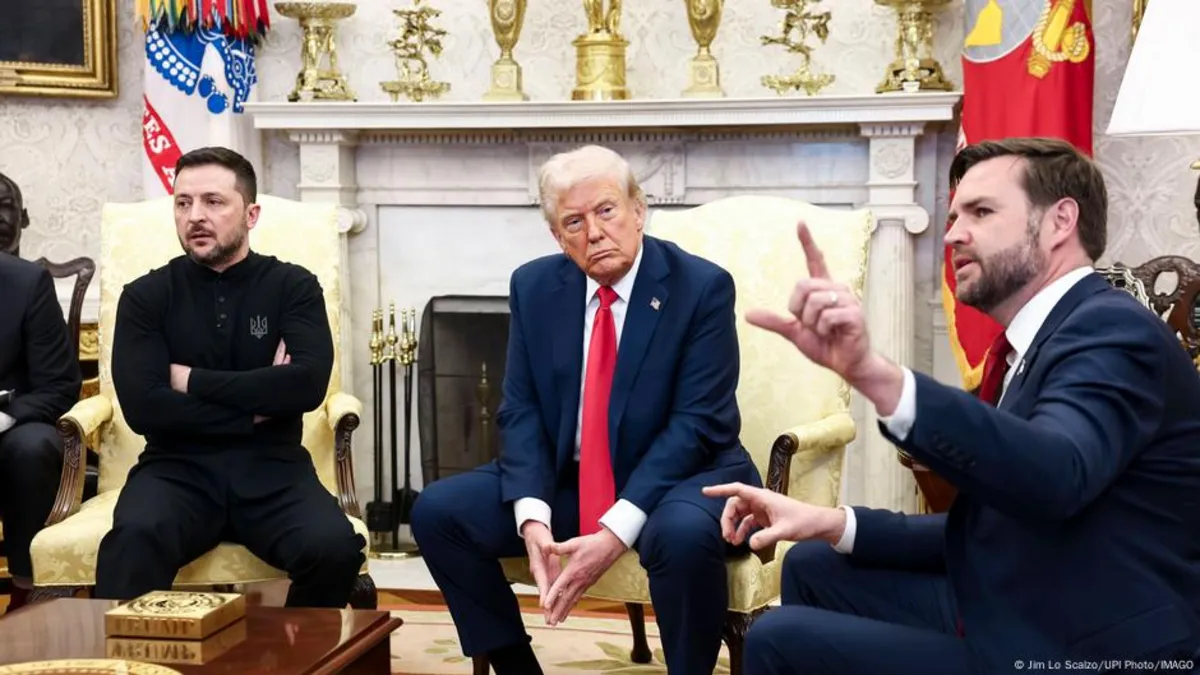
Many Ukrainians have been closely monitoring President Volodymyr Zelenskyy's recent visit to Washington, D.C. During this pivotal trip, Ukraine and the United States were expected to sign a significant agreement concerning minerals. This agreement was anticipated to facilitate negotiations aimed at achieving peace in Ukraine. However, the situation took a dramatic turn due to a confrontation between Zelenskyy, U.S. President Donald Trump, and Vice President JD Vance.
Volodymyr Viatrovych, a member of the Ukrainian political party European Solidarity, expressed his belief that Zelenskyy effectively defended the truth regarding Russia's aggression against Ukraine. Viatrovych emphasized the importance of articulating who instigated the war and identifying the true aggressor. Unfortunately, he noted, the White House was not receptive to these realities. In a post on Facebook, he criticized Trump and Vance for misrepresenting the war and attempting to coerce Zelenskyy into endorsing their false narrative. He stated, "It is good that this did not happen, because truth is one of the most important components of war." Viatrovych acknowledged the necessity of American weapons in Ukraine's fight but stressed that understanding the truth of the situation is equally vital.
Conversely, Oleksiy Honcharenko, another parliamentarian from the European Solidarity party, voiced his disapproval of Zelenskyy's conduct during the meeting, describing the encounter as horrifying and signaling a potential end to relations with Trump. Meanwhile, Zelenskyy's closest allies, including Andriy Yermak, the head of the President's Office, Prime Minister Denys Shmyhal, Interior Minister Ihor Klymenko, and Servants of the People party leader David Arakhamia, publicly supported him. They all underscored the necessity for genuine security guarantees for Ukraine, highlighting that security equates to life and a future free from conflict and fear. "Without real guarantees, war will come back," Yermak cautioned on Telegram, while thanking the American public for their continued support.
Following the events in Washington, Serhiy Herasymchuk from the Foreign Policy Council — Ukrainian Prism posited that not only the U.S. and Russia but also Ukraine would need to engage in future negotiations to conclude the war. He suggested that Europe, having largely sided with Ukraine, would also be part of these discussions. "With a few exceptions, European leaders have consistently expressed their support for Zelenskyy," he remarked, indicating that both the Kremlin and the White House would have to acknowledge this stance.
Herasymchuk anticipates that the fallout from the Washington meeting could lead to significant changes in how the United States is perceived globally. However, he also warned that some European nations might adopt a cautious approach, and certain Southeast Asian countries might consider forming closer ties with China instead of relying on U.S. support. "Others, like Ukraine, will strive to continue the fight," he noted. He expressed hope that the European Union and Ukraine would achieve favorable outcomes together, emphasizing the need for Europe to deliver clear messages of support and actionable measures for Ukraine.
On social media, discussions abound regarding Zelenskyy's reception at the White House and whether his behavior was appropriate. Nataliya Ligachova, editor-in-chief of the online publication Detector Media, defended Zelenskyy on Facebook, stating, "You can't talk like that to the president of a country that has sacrificed thousands of lives for our freedom." In contrast, Ilya Neshodowskyy, director at the Institute for Socio-Economic Transformation, felt that Ukraine was humiliated during the meeting. He acknowledged that while it was crucial for Zelenskyy to defend Ukraine's dignity, engaging in an argument was a misstep.
Some critics argue that the agreement would not provide Ukraine with meaningful security, noting that Trump has not shown willingness to increase military support. Sergiy Koshman from the We are Europeans movement argued that Trump and his administration aimed to appease their voter base at the expense of Ukraine's dignity. He pointed out the contrasting perception of Zelenskyy as a hero globally and Trump's dismissive remarks, suggesting that acknowledging such treatment was essential.
Journalist Serhiy Rudenko characterized the exchange between Trump and Zelenskyy as a scripted performance. He theorized that Trump, realizing he could not meet his campaign promises regarding the war, sought to shift blame onto Zelenskyy. Rudenko described the situation as a "play performed by two actors" who were using Zelenskyy as a scapegoat for their own failures.
In a lighter vein, memes comparing the meeting to famous movie scenes have gained traction on social media, as Ukrainians humorously responded to the provocations of the U.S. administration. Some have even begun fundraising initiatives for nuclear rearmament, with Oleh Horochowskyy, co-founder of Monobank, reporting a rapid collection of two million hryvnias (approximately €46,000) within the first half-hour of the campaign. He proclaimed a goal of raising 10 million in just 10 hours, referencing the historical context of Ukraine relinquishing its nuclear arsenal in 1994.
As the situation continues to unfold, it remains vital for Ukraine to not only secure military support but also to advocate for the truth about its ongoing struggle against aggression.